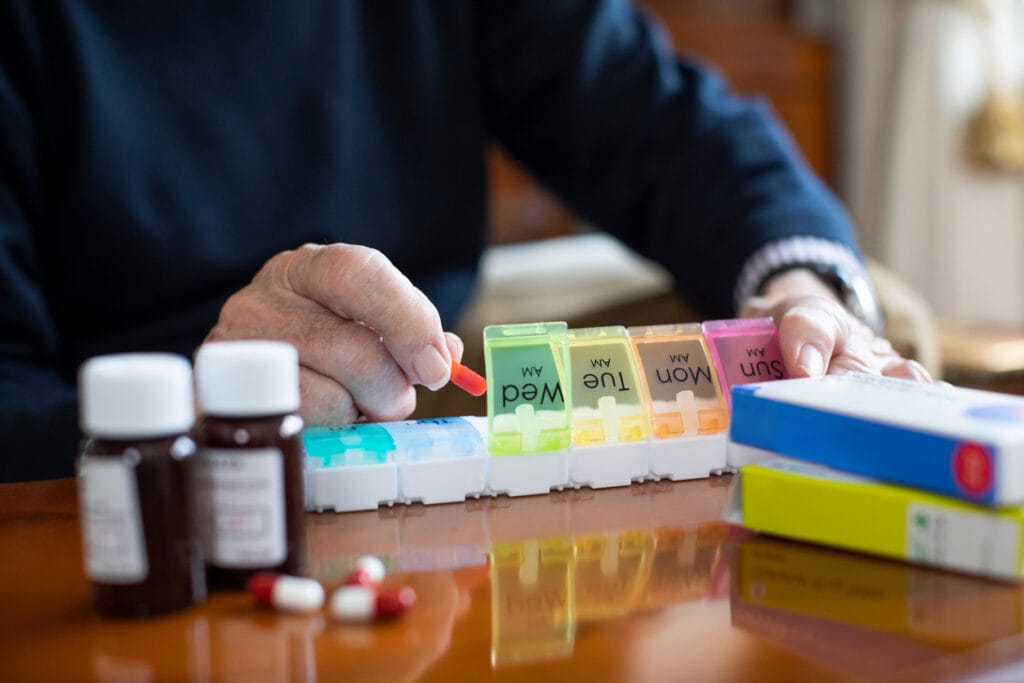Managing medications for our elderly loved ones involves navigating various potential pitfalls that can affect their health and well-being. Here are some common types of medication errors that caregivers need to be aware of:
- Dosage Misunderstanding: Confusion over the correct amount of medication to be taken, leading to underdosing or overdosing.
- Timing Confusion: Errors in the schedule or frequency of medication administration, affecting its effectiveness.
- Drug Interactions: Overlooking potential interactions between different medications, which can amplify side effects or diminish efficacy.
Potential Consequences
The repercussions of medication errors are significant and can profoundly impact seniors' health. Adverse drug reactions, exacerbated medical conditions, and the potential need for hospitalization are among the serious consequences that can result from mismanagement. Such risks highlight the critical importance of meticulous oversight and proactive measures to mitigate these dangers.
Common Causes of Medication Errors
- Complex Medication Schedules: Managing multiple medications can be challenging. The intricacies of different dosages, timings, and administration requirements increase the likelihood of errors if not meticulously organized and monitored.
- Cognitive Challenges: Conditions such as dementia can significantly impair seniors' ability to manage their medications independently. Memory lapses, confusion, and difficulty following instructions can lead to missed doses or incorrect usage, posing risks to their health.
- Communication Barriers: Effective communication among healthcare providers, pharmacists, and caregivers is essential but often fraught with challenges. Misunderstandings or incomplete information about medications, changes in prescriptions, or potential interactions can compromise the accuracy and safety of medication management.
Practical Tips for Avoiding Medication Errors
Navigating medication management for our elderly loved ones requires careful planning and attention to detail. Here are some practical tips to help prevent medication errors:
- Organization Strategies: Utilize pill organizers, medication management apps, or charts to keep track of medications. These tools help ensure doses are taken on time and reduce the risk of confusion, especially with complex medication schedules.
- Maintaining Clear Communication: It's crucial to ensure all healthcare providers are aware of the medications being taken. Keep an updated list handy for doctor visits and consult with pharmacists regularly to discuss any concerns or changes in medication needs.
- Routine Reviews: Regularly review medication regimens with healthcare providers. Periodic assessments help identify potential interactions, adjust dosages as needed, and ensure that the treatment plan aligns with the current health status.

Leveraging Technology for Safety
With seniors often managing multiple medications, the risk of missed doses or medication errors increases. Technological tools and apps can be valuable aids in this area. These range from simple pill reminder apps, such as MyPillBox or Medisafe, to comprehensive medication management platforms like WellMed or Tabula Rasa Health. They help organize dosages, set reminders for medication times, and maintain an accurate record of medications taken.
Benefits of Automated Reminders and Alerts
Automated reminders and alerts offer substantial benefits in promoting medication adherence among caregivers and seniors. By sending timely notifications, these tools help ensure that medications are taken at the correct times, thereby reducing the risk of missed doses or incorrect timings. This reliability not only enhances the overall effectiveness of treatment but also contributes to better health outcomes by maintaining consistency in medication schedules.
Moreover, automated reminders help caregivers manage complex medication regimens more efficiently, allowing them to focus more on providing attentive care and less on tracking medication schedules manually. By minimizing the potential for medication errors, this technology provides peace of mind to caregivers and enhances the safety and well-being of their elderly loved ones.
Creating a Supportive Environment
For family caregivers of elderly loved ones, establishing a supportive home environment is pivotal for effective medication management. Start by setting up a clear daily routine that integrates medication times with regular activities such as meals or bedtime. This predictable schedule helps seniors remember when to take their medications, reducing confusion and ensuring consistency.
Organizing medications using pill organizers or labeled trays simplifies tracking and administration. These tools make it easier for both caregivers and seniors to manage multiple medications by clearly indicating which ones to take at specific times. Additionally, maintaining open communication with healthcare providers ensures a thorough understanding of the medication regimen.
Educating seniors about their medications—explaining dosages, purposes, and potential side effects in straightforward terms—empowers them to take an active role in their own health care. Designating a quiet, well-equipped space for medication administration further enhances focus and reduces distractions, fostering a comfortable and conducive environment for proper medication management.





